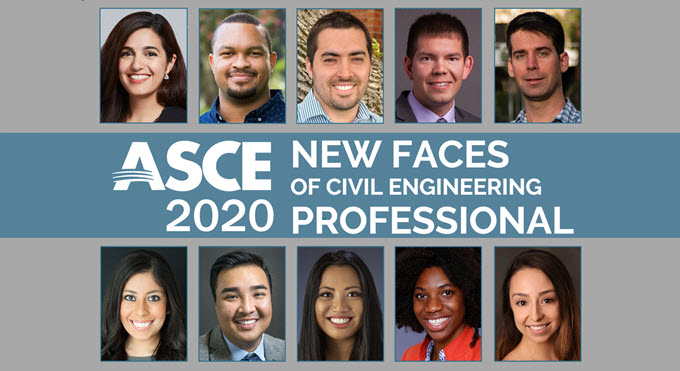It was during the ASCE 2018 Convention. Robin Kemper, earlier that day inducted as the Society president, invited friends and colleagues up to her hotel suite to celebrate the occasion.
Sometime before midnight, there amid the skyscrapers of downtown Denver, someone convinced Joanna Smith to play the piano.
And with that, a gathering of civil engineers became a party.
Pretty soon Smith was playing Beatles classics, mixing in gospel songs, even taking requests from Kemper’s father.
“It was such an amazing time,” said Smith, who also happened to be celebrating her birthday that night.
We should note that Smith was there that night as a member of the convention’s Technical Program Subcommittee, and she’s an exceptionally accomplished geotechnical engineer for AECOM in New York City. So why are we talking about the piano?
 “Music and math go hand in hand. It’s all about numbers and strings and diameters, vibrations. It’s all a part of the puzzle of engineering,” Smith said, adding with a laugh, “I don’t know, I’m kind of usually the outlier anyway.
“Music and math go hand in hand. It’s all about numbers and strings and diameters, vibrations. It’s all a part of the puzzle of engineering,” Smith said, adding with a laugh, “I don’t know, I’m kind of usually the outlier anyway.
“I just think there’s so much more to engineering than calculations. It’s the full circle.”
ASCE has honored Smith as a 2020 New Face of Civil Engineering.
Working with her hands
Smith grew up in the Bronx, the go-to for home repairs, even as a kid.
“When computers or printers or anything mechanical started acting up, my father would often summon me to figure it out,” Smith said. “I was kind of that child who was pretty much finding solutions around the house. I liked picking things apart and putting them back together. I liked working with my hands.”
Those interests and skills took a decidedly civil engineering turn when Smith went to Cancun, Mexico, as part of a mission trip, building a church.
“While I was there, I was part of the group that was literally mixing the cement from scratch,” Smith said. “We did not have a slump test or anything. It was simply a slab-on-grade. Nothing too major. But upon doing that, and doing some bricklaying for the second story of the church, and patching down the backfill to support the entirety of the structure, I recognized that this is definitely something that I want to do.”
She attended Morgan State University for her bachelor’s degree in civil engineering and then Johns Hopkins University for her master’s in geotechnical engineering.
Geotechnical was the civil engineering discipline that would allow her to get her hands dirty, to feel the soil in the ground. When she does student outreach around New York, she always brings soil samples “just so they can see how amazing the earth is,” she said.
Throughout her four years at AECOM, Smith has taken on more project management roles, including leading a subsurface investigation for the second phase of the $1.6 billion Hunts Point Interstate Access Improvement Project.
“I really enjoy seeing the project from a larger scale,” Smith said. “I like geotechnical engineering because even though we are a very small niche, we are the foundation of the project. Any other questions that the superstructure personnel might have, we’re usually the first ones that they’ll call upon.
“And I like leadership. I enjoy being able to find the best viable solution. That’s where I want to move my career forward.”
Extra-extracurriculars
Meanwhile, Smith’s wide range of talents and interests do not sit beside her civil engineering career but instead inform it.
Her piano playing is well-documented. She started playing at 4 and 25 years later, her skills will still liven up any ASCE Convention.
“You’ll see a lot of time engineers are musicians,” Smith said. “It’s all about calculations and being accurate and being precise, being able to practice something over and over until it’s perfect. You can apply that to so many activities.
“And not just the technical aspects. It helps you relate to people differently. When I think of project management, it’s really about being able to put all those disciplines together and being able to see the broader picture.”
Smith also starred in cross-country and rugby as a high school student. She joined a scuba-diving group at Morgan State and is certified to dive 60 feet underwater.
“A lot of the extracurricular activities are filled with science,” Smith said. “You’re talking about water pressure as you go deeper. Equalizing your lungs. Expanding if you hold your breath. Nitrogen being released in your body. There’s just a host of engineering applications. And I’m sure a lot of folks who are engineers do all of these cool things. They scuba-dive, they skydive, they run, they’re into fitness.”
And there’s more. Smith runs Spartan races, obstacle courses that often require marathon endurance while dragging participants through freezing cold mud puddles.
To Smith, all of it makes her a better geotechnical engineer and leader, whether it’s how she approaches climate change or the foundation for a dam.
“In engineering you really start to see how much the extracurricular activities that we choose line up within the guidelines of science and math. And it’s really exciting,” Smith said.
“I think it’s important because it allows you to see things from different angles. When we think about civil engineering, we don’t think about solving every problem the same way.
“It’s important to keep a balance. Be a whole engineer, a whole human being.”



